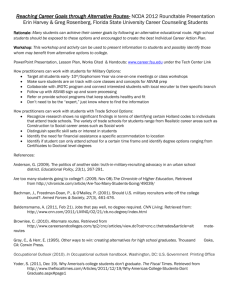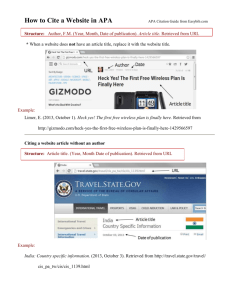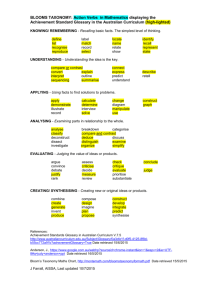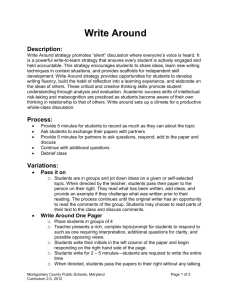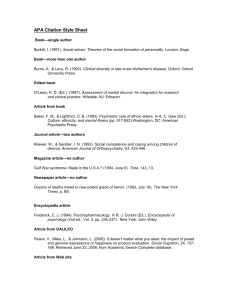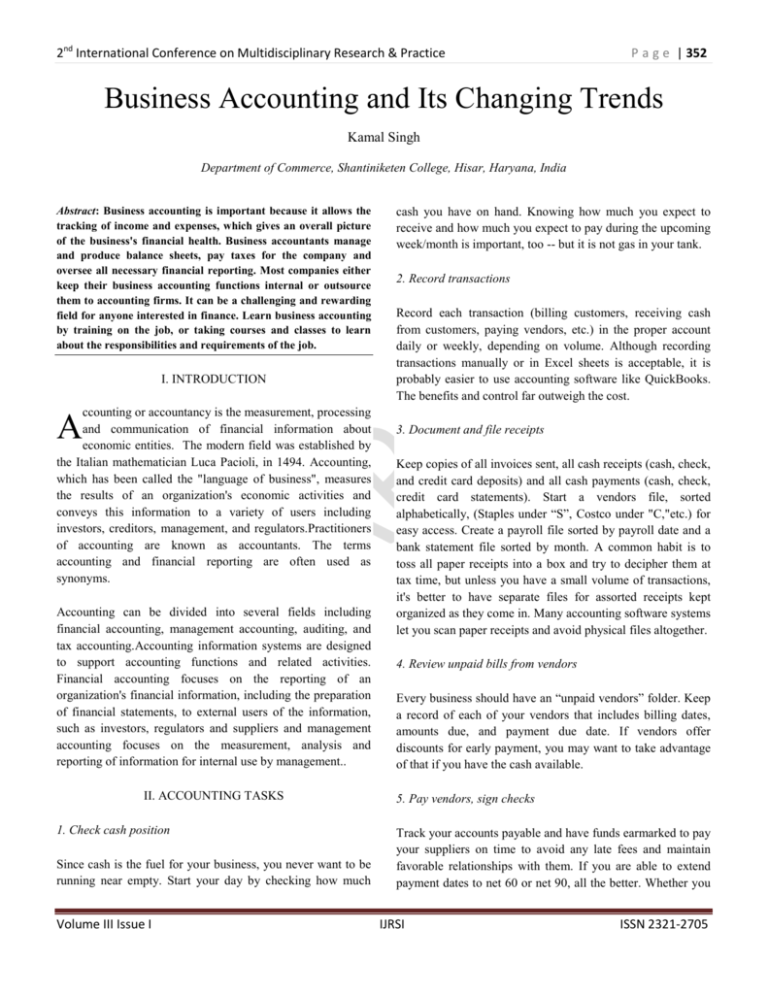
2nd International Conference on Multidisciplinary Research & Practice
P a g e | 352
Business Accounting and Its Changing Trends
Kamal Singh
Department of Commerce, Shantiniketen College, Hisar, Haryana, India
Abstract: Business accounting is important because it allows the
tracking of income and expenses, which gives an overall picture
of the business's financial health. Business accountants manage
and produce balance sheets, pay taxes for the company and
oversee all necessary financial reporting. Most companies either
keep their business accounting functions internal or outsource
them to accounting firms. It can be a challenging and rewarding
field for anyone interested in finance. Learn business accounting
by training on the job, or taking courses and classes to learn
about the responsibilities and requirements of the job.
I. INTRODUCTION
ccounting or accountancy is the measurement, processing
and communication of financial information about
economic entities. The modern field was established by
the Italian mathematician Luca Pacioli, in 1494. Accounting,
which has been called the "language of business", measures
the results of an organization's economic activities and
conveys this information to a variety of users including
investors, creditors, management, and regulators.Practitioners
of accounting are known as accountants. The terms
accounting and financial reporting are often used as
synonyms.
A
Accounting can be divided into several fields including
financial accounting, management accounting, auditing, and
tax accounting.Accounting information systems are designed
to support accounting functions and related activities.
Financial accounting focuses on the reporting of an
organization's financial information, including the preparation
of financial statements, to external users of the information,
such as investors, regulators and suppliers and management
accounting focuses on the measurement, analysis and
reporting of information for internal use by management..
II. ACCOUNTING TASKS
1. Check cash position
Since cash is the fuel for your business, you never want to be
running near empty. Start your day by checking how much
Volume III Issue I
cash you have on hand. Knowing how much you expect to
receive and how much you expect to pay during the upcoming
week/month is important, too -- but it is not gas in your tank.
2. Record transactions
Record each transaction (billing customers, receiving cash
from customers, paying vendors, etc.) in the proper account
daily or weekly, depending on volume. Although recording
transactions manually or in Excel sheets is acceptable, it is
probably easier to use accounting software like QuickBooks.
The benefits and control far outweigh the cost.
3. Document and file receipts
Keep copies of all invoices sent, all cash receipts (cash, check,
and credit card deposits) and all cash payments (cash, check,
credit card statements). Start a vendors file, sorted
alphabetically, (Staples under ―S‖, Costco under "C,"etc.) for
easy access. Create a payroll file sorted by payroll date and a
bank statement file sorted by month. A common habit is to
toss all paper receipts into a box and try to decipher them at
tax time, but unless you have a small volume of transactions,
it's better to have separate files for assorted receipts kept
organized as they come in. Many accounting software systems
let you scan paper receipts and avoid physical files altogether.
4. Review unpaid bills from vendors
Every business should have an ―unpaid vendors‖ folder. Keep
a record of each of your vendors that includes billing dates,
amounts due, and payment due date. If vendors offer
discounts for early payment, you may want to take advantage
of that if you have the cash available.
5. Pay vendors, sign checks
Track your accounts payable and have funds earmarked to pay
your suppliers on time to avoid any late fees and maintain
favorable relationships with them. If you are able to extend
payment dates to net 60 or net 90, all the better. Whether you
IJRSI
ISSN 2321-2705
2nd International Conference on Multidisciplinary Research & Practice
[4].
make payments online or drop a check in the mail, keep
copies of invoices sent and received.
P a g e | 353
Peggy Bishop Lane on Why Accounting Is the Language of
Business, Knowledge @ Wharton High School, September
23, 2013, retrieved December 25, 2013
6. Prepare and send invoices
[5].
"Department of Accounting". Foster School of Business.
Foster School of Business. 2013. Retrieved 31 December
Be sure to include payment terms. Most invoices are due
within 30 days, noted as "Net 30‖ at the bottom of your
invoice. Without a due date you will have more trouble
forecasting revenue for the month. To get paid sooner,
consider offering early payment incentives.
2013.
[6].
Weber, Richard P., and W. C. Stevenson. 1981.
―Evaluations of Accounting Journal and Department
Quality.‖ The Accounting Review 56 (3): 596–612.
[7]. Horngren, Charles T.; Datar, Srikant M.; Foster, George
(2006), Cost Accounting: A Managerial Emphasis (12th ed.),
7. Review projected cash flow
New Jersey: Pearson Prentice Hall
[8].
Managing your cash flow is critical, especially in the first year
of your business. Forecasting how much cash you will need in
the coming weeks/months will help you reserve enough
money to pay bills, including your employees and suppliers.
Plus, you can make more informed business decisions about
how to spend it.
Lung, Henry (2009). Fundamentals of Financial Accounting.
Elsevier.
[9].
Auditors: Market concentration and their role, CHAPTER
1: Introduction". UK Parliament. House of Lords. 2011.
Retrieved January 1, 2014.
[10]. FRS Foundation, 2012. The move towards global standards.
Retrieved on April 27, 2012.
[11]. Robson,
III. ACCOUNTING INFORMATION SYSTEM
Keith.
1992.
―Accounting
Numbers
as
‗inscription‘: Action at a Distance and the Development of
Accounting.‖ Accounting, Organizations and Society 17 (7):
Many accounting practices have been simplified with the help
of accounting computer-based software. An Enterprise
resource planning (ERP) system is commonly used for a large
organisation and it provides a comprehensive, centralized,
integrated source of information that companies can use to
manage all major business processes, from purchasing to
manufacturing to human resources.
685–708.
[12]. A History of ACCOUNTANCY, New York State Society
of CPAs, November 2003, retrieved December 28, 2013
[13]. The History of Accounting, University of South Australia,
April 30, 2013, retrievedDecember 28, 2013
[14]. ک شاورزی, ( ک یخ سرو1980). ت ا ب ا س تان زمان از ای ران ت اری خ
( امروزTranslated from Russian by Grantovsky, E.A.) (in
Persian). pp. 39–40.
Accounting information systems have reduced the cost of
accumulating, storing, and reporting managerial accounting
information and have made it possible to produce a more
detailed account of all data that is entered into any given
system.
[15]. Oldroyd, David & Dobie, Alisdair: Themes in the history of
bookkeeping, The Routledge Companion to Accounting
History, London, July 2008, ISBN 978-0-415-41094-6,
Chapter 5, p. 96
[16]. Oldroyd, David: The role of accounting in public
REFERENCES
expenditure and monetary policy in the first century AD
Roman Empire, Accounting Historians Journal, Volume 22,
[1]. Needles, Belverd E.; Powers, Marian (2013). Principles of
Number 2,Birmingham, Alabama, December 1995, p.124,
Financial Accounting. Financial Accounting Series (12 ed.).
Olemiss.edu[dead link]
Cengage Learning.
[17]. Heeffer, Albrecht (November 2009). "On the curious
[2]. Accounting Research Bulletins No. 7 Reports of Committee
historical
of
algebra
and
double-entry
bookkeeping" (PDF). Foundations of the Formal Sciences.
Procedure, American Institute of Accountants. November
Ghent University. p. 11.
1940. Retrieved December 31, 2013.
[3].
coincidence
on Terminology (Report). Committee on Accounting
DIWAN,
Jaswith.
ACCOUNTING
[18]. Lauwers, Luc & Willekens, Marleen: "Five Hundred Years
CONCEPTS
&
of Bookkeeping: A Portrait of Luca Pacioli" (Tijdschrift voor
THEORIES. LONDON: MORRE. pp. 001–002. id# 94452.
Economie en Management, Katholieke Universiteit Leuven,
1994, vol:XXXIX issue 3, p.302), KUleuven.be
Volume III Issue I
IJRSI
ISSN 2321-2705
2nd International Conference on Multidisciplinary Research & Practice
P a g e | 354
[19]. Timeline of the History of the Accountancy Profession,
[35]. Droms, William G.; Wright, Jay O. (2010), Finance and
Institute of Chartered Accountants in England and Wales,
Accounting for nonfinancial Managers: All the Basics you
2013, retrieved December 28, 2013
need to Know (6th ed.), Basic Books, 2010
[20]. Perks, R. W. (1993). Accounting and Society. London:
[36]. IFAC Members
Chapman & Hall. p. 16. ISBN 0-412-47330-5.
[37]. "Accounting Bodies Network". The Prince's Accounting for
[21]. Labardin, Pierre, and Marc Nikitin. 2009. ―Accounting and
Sustainability Project. Retrieved January 3, 2014.
the Words to Tell It: An Historical Perspective.‖ Accounting,
[38]. "Getting Started". AICPA. AICPA. 2014. Retrieved January
Business & Financial History 19 (2): 149–166.
3, 2014.
[22]. Baladouni, Vahé. 1984. ―Etymological Observations on
[39]. "The
Some Accounting Terms.‖ The Accounting Historians
ACA Qualification".
ICAEW.
ICAEW.
2014.
Retrieved January 3, 2014.
Journal 11 (2): 101–109.
[40]. "Auditors: Market concentration and their role, CHAPTER
[23]. Pixley, Francis William: Accountancy—constructive and
2: Concentration in the audit market". UK Parliament. House
recording accountancy (Sir Isaac Pitman & Sons, Ltd,
of Lords. 2011. Retrieved January 1, 2014.
London, 1900), p4
[41]. "Definition of big four". Financial Times Lexicon. The
[24]. "accounting noun - definition in the Business English
Financial Times Ltd. 2014. Retrieved January 1, 2014.
Dictionary". Cambridge Dictionaries Online. Cambridge
[42]. Knowledge guide to UK Accounting Standards, ICAEW,
University Press. 2013. Retrieved 30 December 2013.
2014, retrieved January 1,2014
[25]. "accounting noun - definition in the British English
[43]. "How to Become an Accountant or Auditor". U.S. Bureau of
Dictionary & Thesaurus".Cambridge Dictionaries Online.
Labor Statistics. United States Department of Labor. 2012.
Cambridge
University
Press.
2013.
Retrieved
30
Retrieved 31 December 2013.
December2013.
[26]. "accounting".
[44]. "150 Hour Requirement for Obtaining CPA Certification".
Merriam-Webster.
Merriam-Webster,
AICPA. AICPA. 2013. Retrieved 31 December 2013.
Incorporated. 2013. Retrieved30 December 2013.
[27]. "accountancy".
Merriam-Webster.
[45]. "Criteria for entry". CPA UK. CPA UK. 2013. Archived
Merriam-Webster,
from the original on 19 August 2013. Retrieved 31
Incorporated. 2013. Retrieved30 December 2013.
December 2013.
[28]. "accountancy noun - definition in the Business English
[46]. "Want a Career in Education? Here's What You Need to
Dictionary". Cambridge Dictionaries Online. Cambridge
Know". AICPA. AICPA. 2013. Retrieved 31 December
University Press. 2013. Retrieved 30 December 2013.
2013.
[29]. "accountancy noun - definition in the British English
[47]. "PhD Prep Track". BYU Accounting. BYU Accounting.
Dictionary & Thesaurus".Cambridge Dictionaries Online.
Cambridge
University
Press.
2013.
Retrieved
2013. Retrieved 31 December2013.
30
[48]. "Accountancy Qualifications at a Glance". ACCA. 2014.
December2013.
Retrieved January 4, 2014.
[30]. King, I. "New set of accounting principles can help drive
[49]. "ACA
sustainable success". ft.com. Retrieved 28 January 2015.
–
The
qualification
of
ICAEW
Chartered
Accountants". ICAEW. 2014. Archived from the original on
[31]. Baiman, Stanley. 1979. ―Discussion of Auditing: Incentives
11 October 2013. Retrieved January 4, 2014.
and Truthful Reporting.‖ Journal of Accounting Research 17:
[50]. "FAQs - Become a CPA". AICPA. 2014. Retrieved January
25–29.
4, 2014.
[32]. "Audit Definition". Investopedia. Investopedia US. 2013.
[51]. Oler, Derek K., Mitchell J. Oler, and Christopher J.
Skousen. 2010. ―Characterizing Accounting Research.‖
Retrieved 30 December 2013.
[33]. "Responsibilities and Functions of the Independent Auditor"
Accounting Horizons 24 (4): 635–670.
(PDF). AICPA. AICPA. November 1972. Retrieved 30
[52]. Coyne, Joshua G., Scott L. Summers, Brady Williams, and
David a. Wood. 2010. ―Accounting Program Research
December 2013.
Rankings by Topical Area and Methodology.‖ Issues in
[34]. "1.2 Accounting information systems". Introduction to the
context of accounting. OpenLearn. Retrieved 3 February
Accounting Education 25 (4) (November): 631–654.
2014.
[53]. Astrid Ayala and Giancarlo Ibárgüen Snr.: "A Market
Proposal for Auditing the Financial Statements of Public
Volume III Issue I
IJRSI
ISSN 2321-2705
2nd International Conference on Multidisciplinary Research & Practice
Companies" (Journal of Management of Value, Universidad
P a g e | 355
[56]. Aiyesha Dey, and Thomas Z. Lys: "Trends in Earnings
Francisco Marroquín, March 2006) p. 41, UFM.edu.gt
Management
and
Informativeness
of
Earnings
[54]. Bratton, William W. "Enron and the Dark Side of
Announcements in the Pre- and Post-Sarbanes Oxley Periods
Shareholder Value" (Tulane Law Review, New Orleans,
(Kellogg School of Management, Evanston, Illinois,
May 2002) p. 61
February, 2005) p. 5
[55]. "Enron files for bankruptcy". BBC News. 2001-12-03.
[57]. quickbooks.intuit.com/r/bookkeeping/small-business-
Retrieved 2008-03-15.
Volume III Issue I
accounting-checklist-10-things
IJRSI
ISSN 2321-2705

